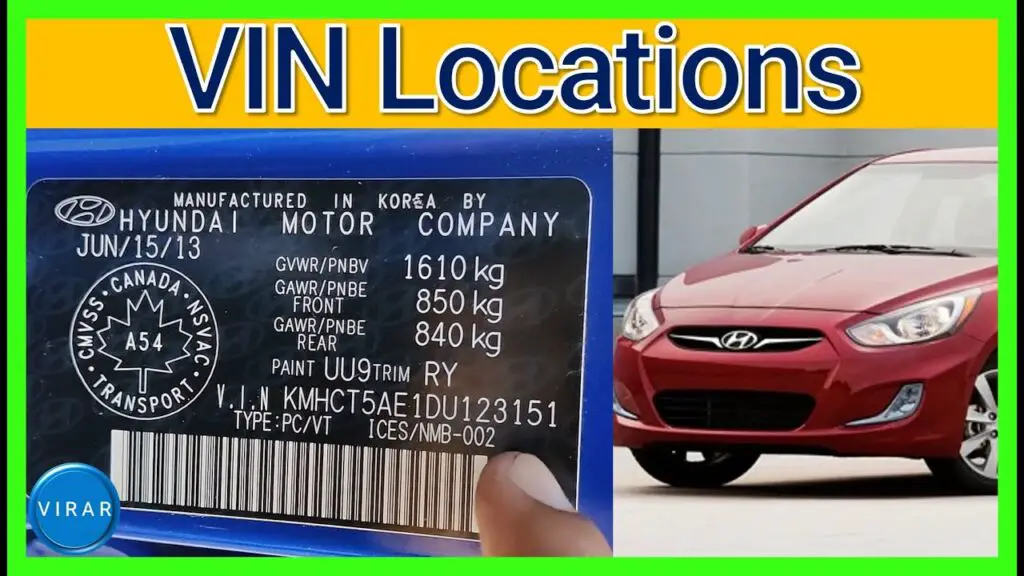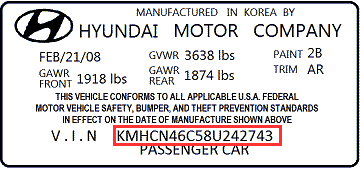Hyundai recalls by VIN number allow vehicle owners to quickly check if their specific Hyundai model is affected by a safety recall. By entering the 17-digit VIN on Hyundai’s official recall website or NHTSA’s database, owners can access detailed recall information and arrange for free repairs.
When it comes to car ownership, safety and reliability are top priorities. One critical aspect of vehicle safety involves staying updated with manufacturer recalls—especially for brands like Hyundai, which has issued several major recalls over the years. Hyundai recalls by VIN number are the most precise and effective way for vehicle owners to check if their car is affected by any outstanding safety notices.
This comprehensive guide will discuss about Hyundai vehicle recalls, how to check for them using the VIN, recent examples of Hyundai recalls, the repair process, legal rights, and more.

Contents
- 1 What Is a Vehicle Recall?
- 2 Why Do Hyundai Vehicles Get Recalled?
- 3 Hyundai VIN Number
- 4 How to Check Hyundai Recalls by VIN Number
- 5 Major Hyundai Recalls (2020–2024)
- 6 Why VIN-Based Recall Checks Are So Important
- 7 What Happens if You Ignore a Recall?
- 8 How to Get Recall Repairs Done (For Free)
- 9 How Hyundai Handles Recalls
- 10 Tips for Buying a Used Hyundai Vehicle
- 11 Frequently Asked Questions
- 12 Conclusion
What Is a Vehicle Recall?
A vehicle recall is a public notification issued by an automaker (or ordered by a government body like the NHTSA) when a vehicle model has a safety-related defect or non-compliance with federal safety standards. These problems can range from faulty airbag systems and fire hazards to engine stalling and braking issues.
Manufacturers are required to offer free repairs, replacements, or reimbursements to resolve the issue.
Why Do Hyundai Vehicles Get Recalled?
Over the last decade, Hyundai has grown into a major automotive brand in the U.S. and globally. However, like other automakers, Hyundai vehicles have occasionally faced problems that triggered recalls. Some common reasons include:
- Engine stalling and fire risks
- Electrical system malfunctions
- Brake system defects
- Transmission control errors
- Battery charging failures in EVs
These recalls often affect tens or hundreds of thousands of vehicles at once.
Hyundai VIN Number
A Vehicle Identification Number (VIN) is a unique 17-character code that identifies the specific car. No two cars have the same VIN. This code contains information about the manufacturer, model year, engine type, and more.
Where to Find the VIN:
- On the dashboard (driver’s side, visible through the windshield)
- Inside the driver’s door frame
- On the vehicle registration
- On the insurance documents

How to Check Hyundai Recalls by VIN Number
Using your Hyundai’s VIN to check for recalls is the most accurate method. Here’s a step-by-step guide:
Step 1: Get the 17-digit VIN
Make sure the number is complete—do not guess or alter any character.
Step 2: Visit These Official Sites:
Step 3: Enter the VIN and Search
The tool will list any active safety recalls specific to your car. If nothing comes up, your vehicle is likely up-to-date.
Major Hyundai Recalls (2020–2024)
Hyundai has faced several high-profile recalls in recent years. Here are some notable examples you should be aware of:
2023 – Engine Compartment Fire Risk
- Vehicles Affected: 3.4 million Hyundai and Kia vehicles
- Issue: Brake fluid leaks caused by ABS control module defects could result in fire
- Models: Elantra (2011–2015), Genesis Coupe, Santa Fe, Tucson
- Resolution: Replace ABS fuse, inspect control module
- Advice: Park vehicles outdoors until repairs are complete
2024 – EV Drive Power Loss Recall
- Vehicles Affected: Over 147,000 EVs
- Issue: ICCU charging control unit failure
- Models: 2022–2024 Ioniq 5, Ioniq 6, Genesis GV60
- Symptoms: Loss of drive power, warning lights
- Fix: Software update, ICCU replacement
- Urgency: High—can leave drivers stranded without warning
2021 – Connecting Rod Bearing Seizure
- Issue: Premature engine wear caused by debris during manufacturing
- Models: Sonata, Santa Fe, Tucson, Veloster
- Fix: Engine inspection, possible engine replacement
2020 – Parking Brake Failure
- Issue: Auto-hold brake feature could disengage
- Models: Palisade, Sonata Hybrid
- Fix: Software patch
These recalls highlight how critical it is to stay informed via Hyundai recalls by VIN number.
Why VIN-Based Recall Checks Are So Important
Using the VIN ensures:
- Accurate match to your specific car
- No missed recalls (even obscure ones)
- Legal compliance for safety standards
- Peace of mind for you and your family
What Happens if You Ignore a Recall?
Ignoring a recall can put you and others at risk. Here’s what could go wrong:
- Increased risk of crashes or injuries
- Possible mechanical breakdowns
- Insurance claims may be denied if defect was known
- Lawsuits or legal penalties in case of incidents
You’re legally entitled to a free fix—so don’t wait!
How to Get Recall Repairs Done (For Free)
Once you’ve confirmed an open recall using your VIN, follow these steps:
- Call Your Local Hyundai Dealer
- Schedule a repair appointment
- Bring Your Vehicle In
- Repairs are usually free, even if your car is out of warranty
- Get Confirmation
- Ask for written proof that the recall was completed
How Hyundai Handles Recalls
Hyundai follows NHTSA guidelines and usually offers:
- Free replacement parts or service
- Loaner cars if repairs take longer
- Notices by mail and email
- Follow-up reminders if you don’t respond
In severe cases (e.g., engine fires), Hyundai has also offered extended warranties or full engine replacements.
Tips for Buying a Used Hyundai Vehicle
Before buying a pre-owned Hyundai:
- Use the VIN to check recall history
- Ask the seller for recall service records
- Only buy from reputable dealerships
- Use Hyundai’s Certified Pre-Owned program for added confidence
Frequently Asked Questions
Here are some FAQs about Hyundai recalls by VIN number –
1. Can I drive my Hyundai if it has a recall?
If the recall is related to minor issues, you may drive temporarily. But recalls involving brakes, engines, or fire risk require immediate attention.
2. Is my Hyundai still under warranty if it has a recall?
Yes. Recalls are handled separately from warranty coverage. Even if your car is out of warranty, recall-related repairs are still free.
3. Will I be notified automatically?
Hyundai typically sends recall notices by mail or email. However, you should check manually at least twice a year.
4. How long do recall repairs take?
Minor issues may be resolved within an hour, but major repairs (e.g., engine replacement) could take several days.
5. Can I check Hyundai recalls by license plate instead of VIN?
Yes, some services like Carfax or state DMVs allow plate-based recall lookups. But VIN remains the most accurate.
Conclusion
Checking for Hyundai recalls by VIN number is one of the smartest and safest things you can do as a car owner. With recent recalls affecting millions of Hyundai vehicles—from fire hazards to EV battery failures—VIN-based checks allow you to get precise information and act quickly.
Don’t rely solely on dealership notifications. Make it a habit to check your VIN on the Hyundai website or NHTSA database every few months. Safety, peace of mind, and even your vehicle’s value depend on it.